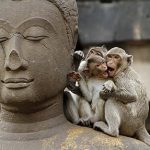The Buddha was the smartest psychologist I’ve ever read. Over 2500 years ago he was teaching people about the human mind so that they might better understand themselves and discover how to stop their own suffering. Buddha wasn’t a god or a messiah – he was simply a very wise teacher with keen insights into human nature. He learned much by meditating and learning from his own experiences, as well as by observing the behavior of others.
Buddha described the human mind as being filled with drunken monkeys – jumping around, screeching, chattering, and carrying on endlessly. We all have a “monkey mind,” Buddha said – with dozens of monkeys all clamoring for attention. Fear is an especially loud monkey – sounding the alarm incessantly – pointing out all the things we should be wary of and everything that could go wrong.
Buddha showed his students how to meditate in order to tame the drunken monkeys in their minds. It’s useless to fight with the monkeys or to try to banish them from your mind because “that which you resist persists.” Instead, Buddha said, if you will spend some time each day in quiet meditation – simply calm your mind by focusing on your breathing or a simple mantra – you can, over time, tame the monkeys. They will grow more peaceful if you lovingly bring them into submission with a consistent practice of meditation.
I’ve found that Buddha was right. Meditation is a wonderful way to quiet the voices of fear, anxiety, worry, and other negative emotions.
I’ve also found that engaging the monkeys in gentle conversation can sometimes calm them down. I’ll give you an example: Fear seems to be an especially noisy monkey for people like me who own their own business. As the years go by, Fear Monkey shows up less often, but when he does, he’s always very intense. So I take a little time out to talk with him:
“What’s the worst that can happen?” I ask him.
“You’ll go broke,” Fear Monkey replies.
“OK, what will happen if I go broke?” I ask.
“You’ll lose your home,” he answers.
“OK, will anybody die if I lose my home?” I ask.
“Hmmm, no, I guess not,” he responds.
“Well, it’s just a house, isn’t it? There are other places to live, right?” I continued.
“Uh, yes, I guess so,” Fear Monkey agrees.
“OK then, can we live with it if we lose the house?” I ask.
“Yes, we can live with it,” he concludes.
And that usually does it. By the end of the conversation, Fear Monkey is still there, but he has calmed down. And I can get back to work, running my business and living my life.
Learning to manage your own monkey mind is one of the best things you can do to transform your fears. Pay attention to how your monkeys act – listen to them and get to know them, especially Fear Monkey. Take time to practice simple meditation on a regular basis. Learn how to change the conversations in your head. Practice kind, loving, positive self-talk and see how it can transform your fears.



